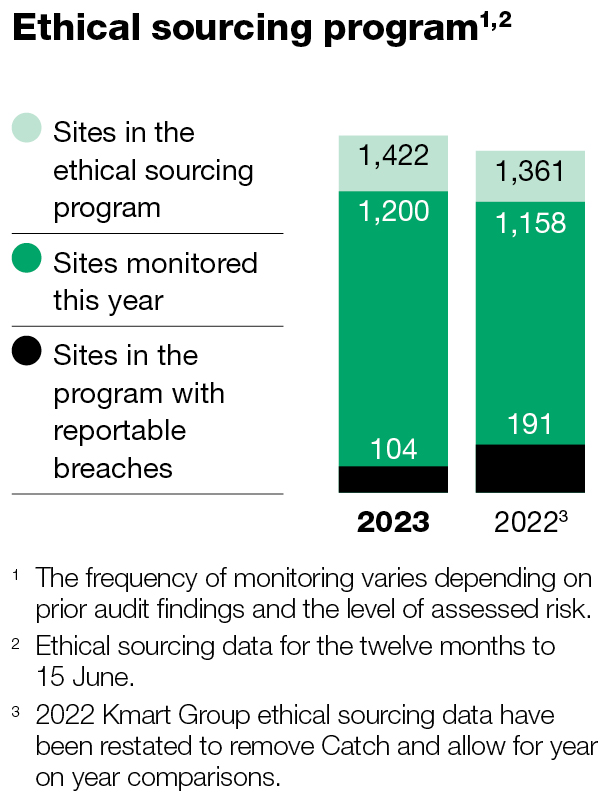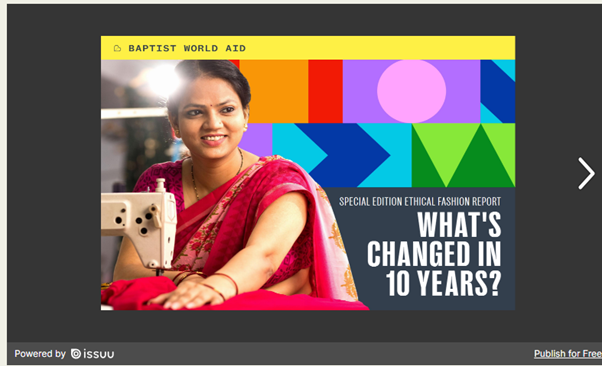
Kmart Group - Human rights and ethical sourcing
Kmart Group acknowledges its responsibility to respect human rights and promote environmental sustainability within its supply chain. Stakeholders expect the products sold across the Kmart Group network are not produced in a way that compromises the rights of workers or adversely impacts the environment of sourcing countries.
The complexity and depth of supply chains remain key challenges for Kmart Group in its ethical sourcing and wider sustainability efforts. The Kmart Group Ethical Sourcing Program includes a detailed compliance framework designed to support suppliers to meet the Kmart Group Ethical Sourcing Code. Factory disclosures and third-party factory audits are central to the program. Where critical, major and other non-conformances are identified, corrective actions are implemented and improvements are monitored through follow-up audits.
During the 2023 financial year, Kmart and Target continued their efforts to strengthen the Kmart Group Ethical Sourcing Program. Achievements in the 2023 financial year are provided below.
Factory compliance and transparency
- More than 1,200 tier 1 supplier factories were subject to 1,379 third-party ethical sourcing audits in the financial year.
- Kmart Group continued the half yearly disclosure process for suppliers of own-brand and licensed brand product (apparel and home textile) requiring them to complete a modern slavery declaration and survey regarding cotton sourcing and yarn and fabric manufacturers. The disclosure process aids in the mitigation of modern slavery risks arising from high-risk cotton regions and supports continued efforts to map tier 2 and 3 processing facilities. Through the modern slavery declaration and survey, Kmart Group identified a further 1,031 (Kmart: 677, Target: 568) tier 2 and 3 facilities involved in the process of yarn (spinner), weaving, knitting, dyeing, printing, finishing or washing. These facilities are publicly disclosed on the Kmart and Target websites.
- A new animated ethical sourcing and modern slavery training video was developed targeting Kmart Group suppliers and team members. The training video explains Kmart and Target’s modern slavery and ethical sourcing risks and how the Kmart Group Ethical Sourcing Program works to mitigate those risks.

External benchmarks
- Kmart and Target achieved an equal third ranking in the 2023 Fashion Transparency Index (FTI). The FTI ranks 250 of the world’s largest fashion brands and retailers according to what information they disclose about their social and environmental policies, practices and impacts in their operations and supply chain.
- Each year the Ethical Fashion Report, one of Australia’s most recognised ethical fashion benchmarks, rates the companies behind Australia’s largest fashion brands on their ethical performance. In 2023, both Kmart and Target were recognised in equal 10th place out of 120 companies. Kmart was recognised in the top five companies for improvement over the benchmark’s 10-year history.
BSR HER
Kmart Group continues to support two BSR HER programs (HER Heath and HER Essentials) in line with its public commitment to gender equality and to provide professional skills, health or education training to at least 100,000 women in the Kmart Group supply chain by December 2025. As of May 2023, there were 83,875 female workers enrolled in different BSR HER+ programs across 41 of Kmart and Target supplier factories in Bangladesh, India and Vietnam. Of these female workers, 43,881 have now completed HER programs. An assessment of the HER Essentials program has reported that it builds confidence of women and illiterate workers in using technology, supports explanation of sensitive topics (e.g. reproductive health) and provides a channel for informal feedback among workers.
Living wage and responsible purchasing
Kmart and Target continue their membership in Action, Collaboration, Transformation (ACT), a collaboration between international brands and retailers, and IndustriALL Global Union, the international trade union federation. ACT aims to achieve a living wage in the garment and textile industry in countries such as Bangladesh, Cambodia, and Turkey. In the past year, Kmart and Target have made good progress on the implementation of the ACT Global Purchasing Practices Commitments as outlined below.
Kmart
- Kmart received an improved overall score of 4.5 out of 5 in the 2023 ACT Purchasing Practice Survey for all the direct sourced garment, textile and footwear suppliers, compared to a score of 4.3 in 2021.
- Kmart received improved average scores in all 16 sections of the survey, with the biggest improvements in the price quotations and sampling sections.
- Kmart received a high average score of 4.8 out of 5 in five different sections: sourcing practices, product development, order placement, re-orders and strategy and alignment.
Target
- Target received an improved overall score of 4.4 out of 5 in the 2023 ACT Purchasing Practice Survey for all the direct sourced garment, textile and footwear suppliers, compared to a score of 4.2 in 2021.
- Target received improved average scores in 13 sections of the survey, with the biggest improvements in the price quotations and sales and transparency sections. Target received the same average scores in the other three sections.
- Target received a high average score of 4.7 out of 5 in four different sections: sourcing practices, product development, order placement and strategy and alignment.
